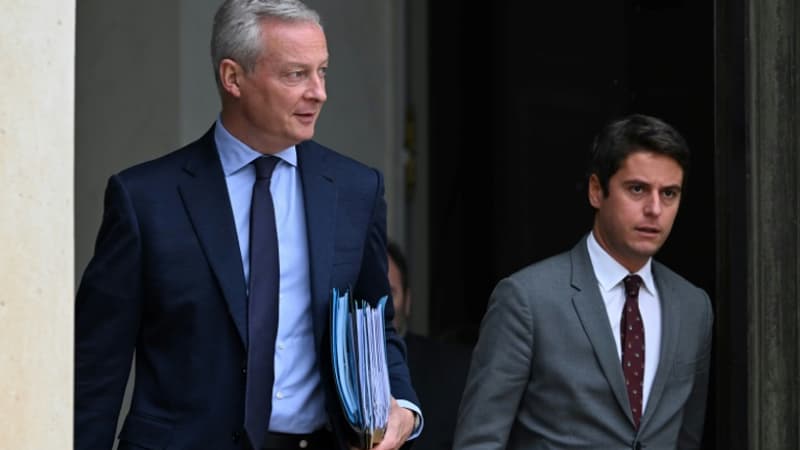The government presented this Monday its draft finance law (PLF) for 2023, a budget that it considers “responsible and protective”, according to the expression of the Minister of Economy, Bruno Le Maire. These are the main measures.
• A tariff shield is maintained
As previously announced by the government, in 2023 a price shield is maintained on electricity and gas prices, in a less protective version, however, than in 2022. The increase in regulatory prices will be 15% (from January 1 for gas and February 1 for electricity), while they would have doubled without public intervention, according to Bercy.
The cost of the energy shield is estimated at 45,000 million euros in 2023. But Bercy estimates that the real cost for the State will amount to only 16,000 million euros (11 for gas and 5 for electricity), thanks to the mandatory levies on producers of renewable energies, which must return to the State a part of the benefits related to the explosion of the fields.
• Commitments for the energy transition
In total, the budget for “ecology, sustainable development and mobility” will be 26,500 million euros in 2023, compared to 20,600 million in the first finance law of 2022 and 29,900 according to the finance reform law voted in the summer , which includes the discount device on each liter of fuel, said the Minister of Public Accounts Gabriel Attal.
The Ecology budget includes several emblematic measures announced by the Government, such as the Bicycle Plan (250 million euros) or the Green Fund of 1,500 million euros for local entities. The “MaPrimeRénov'” system for energy renewal is increased to 2,500 million euros (+500 million). The support for the greening of the vehicle fleet is allocated to 1,300 million euros. This includes the “social leasing” measure, a low-cost electric car rental scheme, reserved for less privileged households.
Finally, France will no longer give guarantees for any fossil energy export projects (exploration, refining, transportation).
Growth at 1% in 2023, inflation at 4.3%
Despite the uncertainties linked to the war in Ukraine and the economic difficulties of France’s trading partners, the Ministry of Finance forecasts positive growth in 2023, up to 1%. The government’s estimate is higher than that of the Banque de France, which expects growth of 0.8% next year at best and more likely 0.5%, or even that of the OECD, which expect 0.6%. Economy Minister Bruno Le Maire also stressed that the 1% target is an “ambition” rather than a “certainty”.
The government also expects inflation to slow to 4.3% in 2023 from 5.4% in 2022, two estimates revised up 0.1 point from mid-September. In the immediate future, at the end of 2022, it should remain “at a high level” around 6%, warned Bruno Le Maire on Monday, who wants to make the fight against rising prices the “immediate priority” of France and European countries. Finally, the public deficit should be 5% of GDP this year and next. A return of less than 3% is not expected before 2027.
• Increase in the number of public servants
The government plans an additional 10,764 civil servant positions for the state and its operators in 2023, and promises to fulfill its workforce “stability” mandate over the five-year period. These increases will primarily benefit the Ministry of the Interior: the Prime Minister announced in early September an increase of “8,500 police and gendarmerie posts” over five years in France, including “3,000 from 2023”, which we find in the PLF.
Just over 2,300 full-time equivalent jobs are assigned to the Ministry of Justice. On the National Education side, 2,000 more jobs are planned, in particular to hire AESH (educational and social support) to support students with disabilities. And an endowment of 935 million euros will be released to increase teachers’ salaries.
In the perimeter of the Ministry of Defense, the workforce will be reinforced with more than 1,500 new jobs, in particular “in the fields of intelligence and cyber defense”. And a thousand additional positions are also planned for the Ministry of Labor.
• Business help
True to its promise to lower taxes on production, the government confirms that the suppression of the CVAE (Contribution to the added value of companies, editor’s note) will take place in two years, with a loss of income of 8 thousand million in 2023 and 2024. Three billion euros are foreseen in the budget to protect companies from rising energy prices.
Some 6 billion euros of commitments are registered in France 2030, the program aimed at promoting innovation, Bruno Le Maire indicated. “In exchange, we want the large industrial companies to continue their movement” of relocating and establishing sites in France, the minister warned the attention of French companies.
• Emergency accommodation
5,900 accommodation places will be created for refugees and asylum seekers. The 2023 budget foresees a total increase of 6% in the “immigration, asylum and integration” envelope.
• An “emergency envelope”
“In anticipation”, the government has reserved an “emergency package” for possible additional aid in the event of a further increase in oil prices and therefore fuel at the pump, although according to Bruno Le Maire, “this n This is not the most likely case. The amount of these unallocated credits is just under 2,000 million euros. Any aid in 2023 would be “directed (…) to those who have no choice but to take their vehicle to go to the work,” said the minister.
Source: BFM TV


